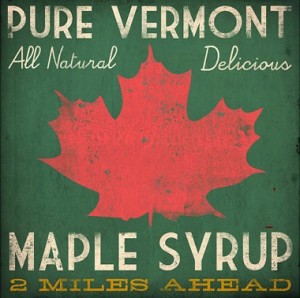We headed around to the back of the building to see if anyone was home. There it was, a modest-sized trailer—the summer residence of the owners of the establishment. I knocked, but there was no response.
A few days later it was really open. Inside were shallow dusty wooden trays displayed on tables. Each seashell had a label with its species and a price. The shells needed dusting, too. The man-eating clam was represented by its shell, which might have contained a cocker spaniel with little room to spare. I felt no fear of being eaten.
In January, 2008, Vermont Public Radio broadcast an account of the Republican State legislator Ted Riehle who had championed the nation’s first anti-billboard law, which had passed the Vermont Legislature and was signed by Governor Phil Hoff forty years earlier in 1968. When it took effect, the billboards in Vermont came down, and were replaced with standard green signs announcing in uniform letters the names of businesses on the road ahead or off on side roads. Seashell City and its signs were gone.
I was surprised to learn that one of my roommates at Middlebury College, Lyman Orton, had helped in own way to bring the billboards down. Here’s what he told the writer Robert F. Wilson,
I rounded up a few fraternity brothers and we went out late at night and began cutting the billboards down. We started with axes but the support timbers seemed as big [as] telephone poles, so we knew that wouldn’t work. We bought crosscut saws, and over a couple of years we got rid of quite few of them. It made the papers, of course, but we never got caught. (I guess the statute of limitations is up, so it’s safe to tell the story!)
Some of Lyman’s inspiration came from his father, Vrest Orton, a man of strong opinions who was one of Vermont’s early billboard opponents and a friend of Ted Riehle. Had the elder Orton known of Lyman’s midnight vandalism? Wilson’s book on Vermont curiosities doesn’t say.
The Vermont Public Radio broadcast which occurred a couple of weeks after Riehle’s death, included an interview with Paul Bruhn, executive director of the Preservation Trust of Vermont. Bruhn and the VPR reporter recalled the stiff opposition the bill had faced from those whose livelihoods depended on outdoor advertizing, and the skill with which Riehle had mustered the environmental forces among the majority Republican legislators. In the end it was Hoff, the governor, who supplied the final push, by bringing along enough Democrats to get the bill passed.

A tasteful Vermont road sign as illustrated by Ryan Fowler of Native Vermont Studio
Someone in Middlebury had told me that the Seashell City billboards, more than anything else, could claim the true credit for the pioneering billboard law. I couldn’t confirm this account either on the internet or by e-mailing friends in Middlebury. I called Paul Bruhn of the Preservation Trust.
“Sure it did,” he said when I asked if Seashell City propelled the unique law towards passage.
“The proponents couldn’t single out anyone’s signs. There was enough controversy already, but Seashell City was on everyone’s mind.”
“Were there any worse signs in the state,” I asked. “No. They were the most egregious.”
I told him about the paper plate “closed” sign and dusty shells. He laughed and said, “I drove by many times on my way to my cousins, but I never went in.”
Today, Vermont tourism and its businesses thrive without the billboards and have done so for forty years. Drive through and look at the State. They never needed the signs in the first place.
Next Week: Neuroma

